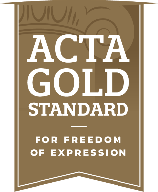
Campus Freedom Initiative™
Free expression is the necessary precondition for the unfettered search for truth on the college campus.
ACTA’s Arizona Report Card
Arizona’s public universities should be leaders in free expression and diversity of thought, with policies and campus cultures that welcome new ideas and different points of view. Although they have taken important steps toward this goal in the last few years, new research from ACTA’s Campus Freedom Initiative® (CFI) indicates Arizona’s public universities have more work to do. In our survey of over 3,000 students at Arizona State University (ASU), Northern Arizona University (NAU), and the University of Arizona (U of A), students still report high levels of intellectual intolerance from fellow students and faculty as well as the need to self-censor on a regular basis.
CFI has evaluated all three of these universities against our Gold Standard for Freedom of Expression™, a comprehensive 20-point action plan for returning higher education to its bedrock mission of excellence and open inquiry. Our Arizona Report Card identifies several steps that Arizona’s public universities can take to further promote open inquiry and the free exchange of ideas. These steps include adopting policies that make a commitment to freedom of expression and intellectual diversity a hiring requirement in all university president searches, establishing institutional neutrality, and encouraging viewpoint diversity in faculty hiring. By implementing our Gold Standard recommendations, ASU, NAU, and the U of A can transform Arizona’s public system of higher education into a model for the nation.
 ACTA Gold Standard for Freedom of Expression™
ACTA Gold Standard for Freedom of Expression™| COMMIT TO A CULTURE OF FREE EXPRESSION | ASU | NAU | UA |
|---|---|---|---|
| Adopt the Chicago Principles on Freedom of Expression or a similarly strong statement. | |||
| Establish clear expectations regarding free expression in student and faculty handbooks and codes of conduct. | |||
| Include a free expression unit in new-student orientations. | |||
| Protect the diversity of political viewpoints by adopting an institutional neutrality policy such as the Kalven Report. | Arizona state law (ARS 15-1864) encourages universities to adopt neutrality in language that resonates with the Kalven Report. To date, ASU has not adopted such a policy. | Arizona state law (ARS 15-1864) encourages universities to adopt neutrality in language that resonates with the Kalven Report. To date, NAU has not adopted such a policy. | Arizona state law (ARS 15-1864) encourages universities to adopt neutrality in language that resonates with the Kalven Report. To date, U of A has not adopted such a policy. |
| FOSTER CIVIL DISCOURSE | ASU | NAU | UA |
| Sponsor campus debates that model civil discourse. | The SpEAK Team attends events and attempts to maintain/promote civil discourse, but neither does it nor any other entity at NAU seem directly involved in civil discourse event planning/selection. | ||
| Promote free expression by encouraging the establishment of student groups devoted to free expression, civil discourse, or representing a plurality of perspectives. | The number of such groups on campus is very small. There is no evidence NAU encourages formation of such groups. | ||
| Establish policies that protect free expression rights on campus and set clear consequences for disruption of sponsored speakers, events, and classes. | In February 2023, an on-campus event hosted by the T.W. Lewis Center generated considerable opposition from students and faculty, some forms of which do not meet Gold Standard expectations. The event was held, but disagreements over how this situation was handled resulted in the closure of the center. | NAU has appropriate policies regarding the rights of invited speakers. The concern here is how the policies play out on campus. In ABOR’s 2024 Free Expression Annual Report, NAU described a 2023 on-campus visit from Charlie Kirk as “successful in allowing individuals to express a range of ideas and perspectives in an open environment.” Publicly available video of the incident suggests the protests against Kirk caused significant disruption to the event.
| |
| Enforce policies that protect free expression rights on campus and apply clear consequences for disruption of sponsored speakers, events, and classes. | |||
| Cultivate Intellectual Diversity | ASU | NAU | UA |
| Encourage presidents, provosts, and deans to model respect for a broad range of viewpoints. | |||
| Guarantee that viewpoint diversity is reflected in student life policies and practices. | |||
| Support academic centers dedicated to free inquiry and intellectual diversity. | There is no evidence of NAU supporting this type of academic center. | ||
| Ensure faculty hiring, evaluation, and promotion processes are based on merit and make clear that the institution is open to intellectual diversity. | There is no evidence of a university-wide effort on these issues. | There is no evidence of a university-wide effort on these issues. | There is no evidence of a university-wide effort on these issues. |
| Break Down Barriers to Free Expression | ASU | NAU | UA |
| Eliminate speech and IT policies that have a chilling effect on free expression. | |||
| Ensure that enforcement of Title VI, Title VII, and Title IX does not infringe on free expression. | |||
| Disband bias response teams. | NAU does not appear to have an official bias response team, but it permits reports of bias to be filed through its Office of Inclusion. | The Bias Education & Support Team (BEST) remains active. Statements from BEST indicate that it does not “restrict free speech or impede academic freedom” and does not “require members of our campus community to participate in any bias activity (phone call, meeting, etc.).” | |
| Review student government policies to ensure viewpoint neutrality in student group recognition and funding. | |||
| Advance Leadership Accountability | ASU | NAU | UA |
| Include commitments to free expression in mission statements, values statements, strategic plans, and other key institutional documents. | Although NAU has published several statements supporting free expression, and although it is governed by ABOR policies on these topics, more recent documents, such as the NAU New Charter and NAU’s 2025 strategic plan, do not include such topics. | ||
| Include a commitment to free expression as a criterion in searches and evaluations for presidents, provosts, and deans. | Michael Crow has been president of ASU since 2002. The search brochure from that time could not be found. His track record suggests he is personally committed to free expression, but such a commitment should be a clear criterion in future presidential searches. | Free expression was missing from ABOR’s approved characteristics for NAU’s most recent presidential search. | U of A’s most recent presidential search concluded in 2024. No mention of free expression could be found in the search brochure. |
| Require free expression and viewpoint diversity training for administrative staff. | No publicly available evidence of such training was found. | No publicly available evidence of such training was found. | No publicly available evidence of such training was found. |
| Conduct regular surveys or other quantitative studies of students and faculty to assess the state of free expression and intellectual diversity on campus. | ABOR’s annual free expression report does not contain this type of data. ASU does not appear to conduct such research on its own. | ABOR’s annual free expression report does not contain this type of data. NAU does not appear to conduct such research on its own. | ABOR’s annual free expression report does not contain this type of data. U of A does not appear to conduct such research on its own. |
The latest Free Expression Annual Report by the Arizona Board of Regents (ABOR) explains, “The Arizona Board of Regents and university leadership strive to protect intellectual freedom and free expression at Arizona’s public universities.” Both ABOR and Arizona’s public universities have adopted important policies aligned with this vision for campus freedom, but, as the following report ACTA and College Pulse shows, more work is needed to provide a culture of free expression for Arizona’s public university students.
View Survey Results45
%of ASU students report not speaking up at least once a month because they think their opinions will be unwelcome.
62
%of NAU students believe professors who say things students find offensive should be reported to the university.
42
%of UA students believe it is more important for colleges to prohibit offensive speech than to expose students to all types of viewpoints.

Launched in 1995, we are the only organization that works with alumni, donors, trustees, and education leaders across the United States to support liberal arts education, uphold high academic standards, safeguard the free exchange of ideas on campus, and ensure that the next generation receives an intellectually rich, high-quality college education at an affordable price.
Discover MoreSign up to receive updates on the most pressing issues facing our college campuses.